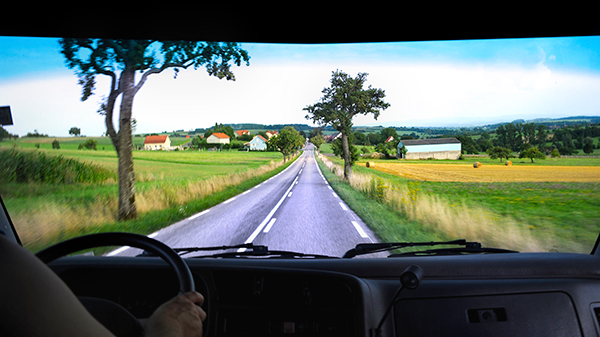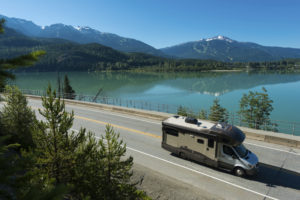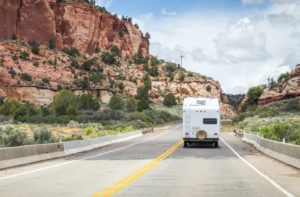Handling Your Motorhome or Trailer Like a Pro: Driving Tips for New RVers

Driving an RV is not much different from driving a regular car, but it is much bigger. While there are RV driving schools that offer training, as long as you keep a few cautionary tips in mind, you should be fine without taking any special classes. Do keep in mind, however, that because of the sheer size of your vehicle, you most definitely want to avoid an accident because you’re not only responsible for the safety of the people in your car but others sharing the road with you.
Of course, you should always carry specialty RV insurance because a regular auto policy is not sufficient. Even when you’re protected, drive extra slowly and carefully until you’re accustomed to your vehicle. You need to be patient in many ways when you drive an RV. Your pickup will be slower, which makes merging and yielding more challenging. It’s also tricky maneuvering narrow streets.
The following are some invaluable driving tips that’ll hopefully help you prevent bumps and scrapes on your way to your next adventure. These tips are especially invaluable to new RV drivers.
- Sit in the driver’s seat and get to know your surroundings, controls, and pedals. There’s nothing worse than not knowing where everything is located while you’re driving a vehicle that’s new to you.
- Adjust your seat correctly. Make sure you can reach the pedals and can touch the controls you need to access while driving.
- Adjust your mirrors. Remember that your side mirrors are the best source of information in the rear. Make sure you can see as much as possible. You may have rear vision cameras on your rig, which help you see what’s behind you more clearly.

- Swing out to make turns. Because your vehicle is bigger than a standard car or SUV you’ll have to adjust how you make turns. If you turn your wheel too soon, you
will run over things, possibly even humans and pets. Be very careful and do this patiently until you get a sense of how wide to turn. - Practice stopping. In an RV, you have to come to a slow stop well ahead of time. Not doing so could be a fender crusher, not a fender bender!
- Drive between 55 and 60 miles per hour. You’ll save on gas, but most importantly, it’ll be easier to stop. Remember, your rig is big. If you hit the car in front of you, the damage will likely be severe.
- Make small steering corrections. If you go too big, you’ll find yourself getting out of your lane.
- Avoid certain challenges like parallel parking, alleys, low ramps, and overpasses.
- Look ahead. Many new RV drivers ask how to gauge where their vehicle is on the highway. Do not focus on the middle line or the line on the side of the lane. Look ahead a few cars’ length (4 cars is wise). Your RV will center itself if you keep looking ahead.
- On side streets or city streets, be especially alert so as to not hit any vehicles that are not parked close enough to the curb.
- Look out for semi-trucks. The wind from one passing by can create suction and throw you slightly off course. Just make note of these vehicles and make slight corrections to keep you from veering towards the truck.
- Practice backing into a parking space. Just as you did when you were prepping for your d
 river’s license, hit an empty parking lot. Create a parking space using markers and practice backing in from a 90-degree angle.
river’s license, hit an empty parking lot. Create a parking space using markers and practice backing in from a 90-degree angle. - If you’re driving up a mountain pass, stay in the far right lane and let others pass. Take your time and don’t put too much pressure on your engine to keep up with other vehicles.
- Driving downhill, use your lower gears – not your brakes. These gears will help prevent your RV from gaining speed.
- If you do not have a back-up camera, do a walk-around to make sure there’s nothing behind you before you pull out.
- Don’t drive more than 400 miles per day.
- Make sure your vehicle is not overloaded. If you get into an accident in your RV you can bet on a weigh-in to be performed. You will not be covered if your vehicle is overweight.
Even if you take all the precautions in the world, you never know when you’ll have an accident with another vehicle or object. Make sure you have specialty RV insurance on your vehicle, even before practicing in a parking lot. Even a small scrape can be expensive if you don’t have the proper coverage. Click here or call (866) 501-7335 and an experienced Insurance Specialist can provide you several quotes to choose from after you express your specific RV needs.
The information in this article was obtained from various sources. This content is offered for educational purposes only and does not represent contractual agreements, nor is it intended to replace manuals or instructions provided by the manufacturer or the advice of a qualified professional. The definitions, terms and coverage in a given policy may be different than those suggested here and such policy will be governed by the language contained therein. No warranty or appropriateness for a specific purpose is expressed or implied.
